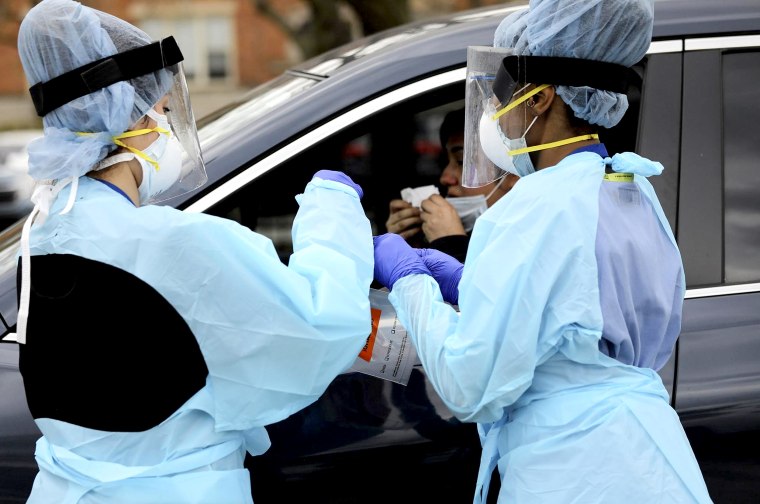Latinos are testing positive to coronavirus at higher rates than any other demographic group in Illinois, alarming officials and experts who say that if the number of COVID-19 cases "continues to rise in Latino communities, so too will the rates of deaths."
Of the more than 28,200 Latinos who have been tested for coronavirus, at least 17,240 have been diagnosed with COVID-19. That's about 61 percent of all Latinos who have been tested, according to Gov. J.B. Pritzker, who said the rate is "more than three times our state average."
“The Latino community is being silently decimated by the coronavirus," Rep. Jesús "Chuy" García, D-Ill., told NBC News in a statement. "If we are serious about controlling the spread of COVID, our country cannot have a plan that ignores Latinos and the conditions we are living in during these times."
In the Chicago area, predominantly Latino neighborhoods such as Little Village, Brighton Park and Gage Park have seen a steep rise in cases, according to data from the Illinois Department of Public Health.
Roberto Escobar, a Salvadoran-American who lived with his wife in Little Village, was only 37 and in good health until he contracted coronavirus and died on May 1. He had recently reunited with his parents, who were visiting, after 18 years without seeing them. But Escobar fell ill shortly afterward, and his parents were now going to return to El Salvador with his remains, his family told Telemundo Chicago.
"My husband was so happy his parents were here, but now he's gone," his wife, Gabriela Hernández, told Telemundo Chicago.
"Our health outcomes should not be determined by ZIP code, last name or country of origin," said García, who represents some of the hard-hit Latino communities and introduced a bill this week to expand health care access to address racial disparities.
García, alongside more than 50 elected officials, stakeholders and health care professionals, have created the Illinois Latino COVID-19 Initiative to build partnerships with state, county and city leaders to address the surge of cases across Latino communities.
A quarter of confirmed cases — despite possible undercount
The coronavirus has claimed the lives of nearly 3,000 people in Illinois; about 15 percent were Latinos while 34 percent were African Americans, according to public health data.
But Latinos make up 25 percent of confirmed cases, surpassing African Americans who account for nearly 20 percent.
In early April, the Latinos in Chicago made up 14 percent of cases and 9 percent of deaths. The latest data shows that they now represent 37 percent of all coronavirus cases in Chicago and 25 percent of deaths.
While African Americans continue to make up "a disproportionate percentage of cases (36 percent) and deaths (52 percent)" in Chicago, Latinos are starting to outpace them as they increasingly make up the largest percentage of cases, Lightfoot said. The same pattern is true statewide.
The rise of coronavirus cases in Latino neighborhoods is consistent with an overall increase of confirmed COVID-19 cases throughout Chicago, according to Lori Lightfoot, the city's mayor. However, city data shows "an increasingly disproportionate impact on the Latinx community," she said.
The newly formed coalition points out that a lack of health care access, language barriers and issues of income and immigration status are some of the pressing issues that need to be tackled as officials work to stem the pandemic and address concerns over an undercount of possible Latino cases.
Over 361,000 people in Illinois have been tested for coronavirus. More than half, 52 percent didn't report their race or ethnicity. "This could be due to a lack of inclusion of race and ethnicity data, gaps in data collection, and outdated segregation of sociodemographic data," according to the coalition.
lllinois Latino COVID-19 Initiative members Dr. Marina Del Rios, an emergency physician, and Aida Giachello, Ph.D., on research faculty at Northwestern University, said they are working "in the planning, development and implementation of culturally and linguistically appropriate strategies" to help provide "educational materials to inform the public about when to seek emergency medical care and when it is safe to stay home when diagnosed with COVID-19," among others efforts.
Lightfoot put together a Racial Equity Rapid Response team to engage the hardest-hit communities "in an effort to build greater equity in health outcomes." Her team includes public health and labor union leaders as well as local officials.
Follow NBC Latino on Facebook, Twitter and Instagram.

